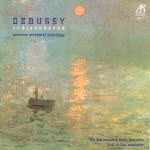Debussy fans have cause to celebrate here: This CD presents rare recordings of four fascinating works, and the first digital recording of his steamy, exotic Six Epitaphes Antiques, a series of piano duets that were faithfully transcribed for orchestra by the fine Debussy conductor Ernest Ansermet. The other works, all of which were orchestrated or, in the case of Printemps–Suite Symphonique, reconstructed by someone else, are beauties as well. Printemps is probably the oddest. Composed for orchestra and wordless chorus, it is alternately languorous and energized, much like Spring itself. The Suite Bergamasque (orchestrated by Gustave Cloez and André Caplet) contains the composer’s justly famous “Clair de lune” as well as three dance movements, each lovelier than the last. The other two short pieces–La puerta del vino (orch. by Henri Busser) and Pagodes (André Caplet)–contain suggestions of Spain and the Far East, respectively, and end this fascinating disc with the same type of familiarity and surprise with which it begins. The playing throughout is exemplary and the performances leave nothing to be desired. Very highly recommended. [4/6/2000]
































